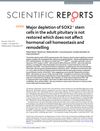 21 citations,
December 2007 in “Primary Care”
21 citations,
December 2007 in “Primary Care” Early diagnosis and treatment of PCOS is crucial to reduce emotional distress and health risks.
 34 citations,
April 2014 in “Psychopharmacology”
34 citations,
April 2014 in “Psychopharmacology” Stress and alcohol affect brain chemicals differently in rats, mice, and humans, influenced by genetic differences.
 July 2015 in “Cambridge University Press eBooks”
July 2015 in “Cambridge University Press eBooks” The document concludes that treatments for female hair loss and excess body hair are available, but managing expectations is important.
 22 citations,
November 2017 in “Scientific Reports”
22 citations,
November 2017 in “Scientific Reports” The pituitary gland functions normally even after losing most SOX2+ stem cells.
 January 2020 in “Archives of Medicine and Health Sciences”
January 2020 in “Archives of Medicine and Health Sciences” Certain immune molecules and stress affect hair loss, and while genes play a role, more research is needed to fully understand and treat it.
 November 2016 in “Elsevier eBooks”
November 2016 in “Elsevier eBooks” Genetic mutations can affect female sexual development, requiring personalized medical care.
 374 citations,
May 2016 in “The Lancet. Diabetes & endocrinology”
374 citations,
May 2016 in “The Lancet. Diabetes & endocrinology” Cushing's syndrome can cause serious health problems, and early treatment is crucial, but some issues may remain after treatment.
 2 citations,
September 2016 in “Journal of evolution of medical and dental sciences”
2 citations,
September 2016 in “Journal of evolution of medical and dental sciences” Thyroid problems are linked to various skin issues, and checking thyroid health is important for people with certain skin conditions.
 22 citations,
November 2014 in “Psychiatric Clinics of North America”
22 citations,
November 2014 in “Psychiatric Clinics of North America” Stress can worsen skin conditions and affect mental health, so doctors should include stress management in skin treatment.
 3 citations,
June 1983 in “Archives of Dermatology”
3 citations,
June 1983 in “Archives of Dermatology” Aminopterin effectively improves skin conditions but has toxic side effects that need careful monitoring.
 114 citations,
December 1951 in “Archives of Dermatology”
114 citations,
December 1951 in “Archives of Dermatology” Aminopterin strongly suppresses epithelial tissues and can treat certain skin conditions but has significant side effects.
 32 citations,
November 1996 in “International Journal of Dermatology”
32 citations,
November 1996 in “International Journal of Dermatology” Antiandrogens can help treat skin conditions like acne and excessive hair in women when used carefully.
 2 citations,
January 1980 in “Acupuncture & electro-therapeutics research”
2 citations,
January 1980 in “Acupuncture & electro-therapeutics research” Hair loss might be due to nerve issues, treatable with electric stimulation or acupuncture.
 48 citations,
March 1997 in “Veterinary Dermatology”
48 citations,
March 1997 in “Veterinary Dermatology” Some cats with sudden hair loss and tiredness might have cancer-related alopecia.
 22 citations,
April 1985 in “Australasian Journal of Dermatology”
22 citations,
April 1985 in “Australasian Journal of Dermatology” Beta-blockers can cause rare skin side-effects, which usually improve after stopping the medication.
 16 citations,
July 2002 in “JOGC/Journal of obstetrics and gynaecology Canada”
16 citations,
July 2002 in “JOGC/Journal of obstetrics and gynaecology Canada” Birth control pills can help reduce mild to moderate acne in women.
 24 citations,
March 2002 in “Expert opinion on investigational drugs”
24 citations,
March 2002 in “Expert opinion on investigational drugs” Different anti-androgen medications can help treat excessive hair growth, but the right choice depends on accurate diagnosis.
3 citations,
January 2017 in “Journal of clinical and diagnostic research” Injecting steroids like Triamcinolone Acetonide for skin treatments can cause Cushing's Syndrome.
 39 citations,
January 2013 in “Indian Journal of Dermatology, Venereology and Leprology”
39 citations,
January 2013 in “Indian Journal of Dermatology, Venereology and Leprology” Eating high glycemic foods and drinking milk may worsen acne by increasing insulin and IGF-1 levels.
11 citations,
October 2020 in “General and comparative endocrinology” Male C57BL/6 mice show age-related fluctuations in certain hormones and their ratios in both blood and hair.
 53 citations,
October 1984 in “Endocrine reviews”
53 citations,
October 1984 in “Endocrine reviews” Excessive hair growth in women often has no known cause and is not linked to race or other hormonal symptoms.
 January 2025 in “Frontiers in Medicine”
January 2025 in “Frontiers in Medicine” Hair follicles are key to treating vitiligo and alopecia areata, but challenges exist.
 4 citations,
January 2010 in “Acta dermato-venereologica”
4 citations,
January 2010 in “Acta dermato-venereologica” Low androgen levels can still cause female pattern hair loss.
 100 citations,
September 2017 in “Molecular and Cellular Endocrinology”
100 citations,
September 2017 in “Molecular and Cellular Endocrinology” Male hormones and their receptors play a key role in hair loss and skin health, with potential new treatments being explored.
 4 citations,
April 2010 in “Expert review of dermatology”
4 citations,
April 2010 in “Expert review of dermatology” Restoring immune privilege in hair follicles could help treat certain types of hair loss.
 November 2018 in “International Journal of Current Pharmaceutical Research”
November 2018 in “International Journal of Current Pharmaceutical Research” PCOS is a hormonal disorder causing symptoms like irregular periods and acne, and increases the risk of diabetes and heart disease.
 15 citations,
August 1998 in “Australasian journal of dermatology”
15 citations,
August 1998 in “Australasian journal of dermatology” The document concludes that various cosmetic and drug treatments are available for hirsutism, and some new drugs show promise.
 81 citations,
July 2008 in “The Journal of Clinical Endocrinology and Metabolism”
81 citations,
July 2008 in “The Journal of Clinical Endocrinology and Metabolism” Certain mutations in the H6PD gene cause Cortisone Reductase Deficiency by affecting hormone production.
 51 citations,
May 2013 in “The Journal of Steroid Biochemistry and Molecular Biology”
51 citations,
May 2013 in “The Journal of Steroid Biochemistry and Molecular Biology” Certain drugs that block specific enzymes can help treat prostate diseases.
 34 citations,
March 2003 in “Veterinary Dermatology”
34 citations,
March 2003 in “Veterinary Dermatology” Most dogs with alopecia had higher than normal levels of certain hormones, but hair loss might not always be linked to these hormone changes.




























